[bctt tweet=”Publishing a Book: What Happens Next?” username=”LisaTener”]
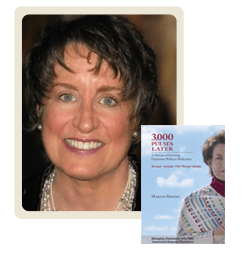 Martha’s Marvelous Journey After Publishing a Book
Martha’s Marvelous Journey After Publishing a Book
Martha: I received the PM360 ELITE 2016 Award for Patient Advocacy because my book 3,000 Pulses Later has made me well known in the U.S. and Internationally as an author and advocate for Transcranial Magentic Stimulation (TMS) depression therapy. I work with patients not as a healthcare professional, but as a person with whom others with Treatment Resistant Major Depression can relate.
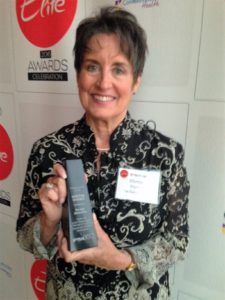 Unbeknownst to me my name was submitted by someone in the neurostimulation industry who’s familiar with my book and the work I do. When I received notification that I was chosen from over 500 submissions I felt surprised and honored.
Unbeknownst to me my name was submitted by someone in the neurostimulation industry who’s familiar with my book and the work I do. When I received notification that I was chosen from over 500 submissions I felt surprised and honored.
Since I spend several hours every month emailing and speaking with patients who need information and encouragement, receiving this award has inspired me to continue my role as a patient advocate.
Lisa: It’s well deserved recognition. You have helped so many people. And the follow up you do with people is a testament to your commitment to your readers and other people who suffer from depression, particularly drug-resistant depression.
Meeting the Man Whose Invention Saved Martha’s Life
Martha: Emory University’s Office of Technology Transfer asked me if I would participate as a patient in a program they created called, “Put a Face On It.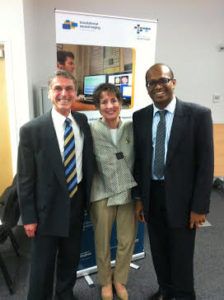 ” The program is meant to convey the human side of how Emory’s technology helps others. They had read my book and felt I could appropriately tell my story of how this new depression technology has benefited me.
” The program is meant to convey the human side of how Emory’s technology helps others. They had read my book and felt I could appropriately tell my story of how this new depression technology has benefited me.
We created several videos and articles explaining the TMS patient experience and the value it has had on my life and can have for others who need an alternative therapy for depression.
Although publishing my memoir exposed my personal crisis in a public way that initially caused me some anxiety, working with the Emory University team has been validating and empowering. I feel more proud of my book and my patient advocacy than I could ever have imagined.
On a personal note, while I was at Emory doing the taping, I was introduced to the research doctor who invented the TMS technology device. When he walked into the room and I was told, “Martha, meet Dr. Charles (Chip) Epstein!”, without skipping a beat, I threw my arms around him and, through my tears, I thanked him for saving my life. It was a moment I think we’ll both always remember.
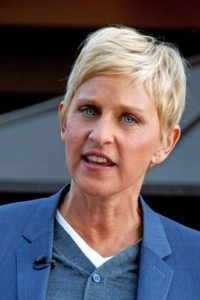
Lisa: Wow. I bet Dr. Epstein felt similarly to the way you’ve felt when people say your book has helped save their lives! You’ve now been on commercials during the Ellen Show, Rachel Ray and the Today Show, among others. Can you share how that happened?
“I Saw You on TV”
The Greatest Reward of Publishing a Book
Martha: First of all, receiving any feedback from people for 3,000 Pulses Later came as a total surprise because I only wrote it so that others would know about the then-unpublicized alternative therapy that might work for them as it did for me. (At the time the book was the first and only first-hand patient account of what the TMS experience is like.)
Since then I’m absolutely amazed to have communicated with hundreds of people from across the United States and from as far away as Australia, South America, Canada, the United Kingdom, Europe, India, and South Africa who have read my book!
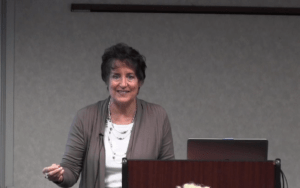
Whenever I deliver speeches either on a local level (libraries, civic organizations, hospitals) or in a larger forum (industry-wide meetings, webinars, and national conventions) unfailingly, people will line up afterward wanting to talk about their own or a family member’s experience with depression or suicide. The feedback for sharing my story always informs me of how prevalent depression is and how necessary it is to continue the conversation.
I receive emails from patients whose stories are nearly identical to mine, thanking me for having the courage to share my story in such a personal way and for helping them find some relief from the pain depression inflicts on them and their loved ones.
Emails and letters come from some who wish TMS had been available before their sibling, parent, or child committed suicide, others who are grateful TMS prevented such a tragedy. I hear from spouses whose marriages teetered on collapse because of depression, but thanks to TMS, they have mercifully been saved.
Ironically, these messages usually arrive just when I say to myself, “I can’t do this patient support work anymore!” because it’s time consuming and sometimes emotionally draining. But then there’s that one particular email that grabs me and pushes me to continue my work. So many of the feedback messages bring tears to my eyes and immeasurable hope to my heart.
Lisa: Wow. Like many authors, I think that speaks to how mission-driven your focus is.
Back to Writing and Publishing a Book
Martha: Yes! Depression and mental health have become an increasingly serious issue in today’s world. If you have a story to share about an important issue and a way to help others with similar problems—go for it! Write that memoir or self-help book and it will be your gift to the world on whatever level it reaches.

I mentioned in an earlier question that the feedback I get is thanks for being courageous. Lisa, I still don’t get that I’m courageous, although it did take a lot of work and guts to complete 3,000 Pulses Later.
For myself, and I hope for your readers, the reward for sharing a powerful, relevant story is more about generosity of spirit. Putting thoughtful, truthful, heartfelt words onto paper and publishing a book that could help others is the best way I know to contribute to the world—generously.
Lisa: What a beautiful sentiment. I wholeheartedly agree!

 Sometimes people feel demoralized when they hear they need a huge platform to get the interest of a large traditional publisher. So I thought I’d provide some myth-busting, clarity and hope on the subject.
Sometimes people feel demoralized when they hear they need a huge platform to get the interest of a large traditional publisher. So I thought I’d provide some myth-busting, clarity and hope on the subject.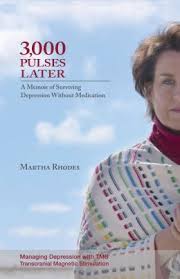 5. Consider self-publishing. There are many advantages–you’ll have your book sooner, you have control, you can make changes more easily, you make more money per book–and the list goes on. Platform never has to stop you from publishing your book. Maybe you don’t even need to sell a huge number of books for your book to make the kind of impact on your life, business and other people’s lives that you are looking for. Bring Your Book to Life Program graduate
5. Consider self-publishing. There are many advantages–you’ll have your book sooner, you have control, you can make changes more easily, you make more money per book–and the list goes on. Platform never has to stop you from publishing your book. Maybe you don’t even need to sell a huge number of books for your book to make the kind of impact on your life, business and other people’s lives that you are looking for. Bring Your Book to Life Program graduate 